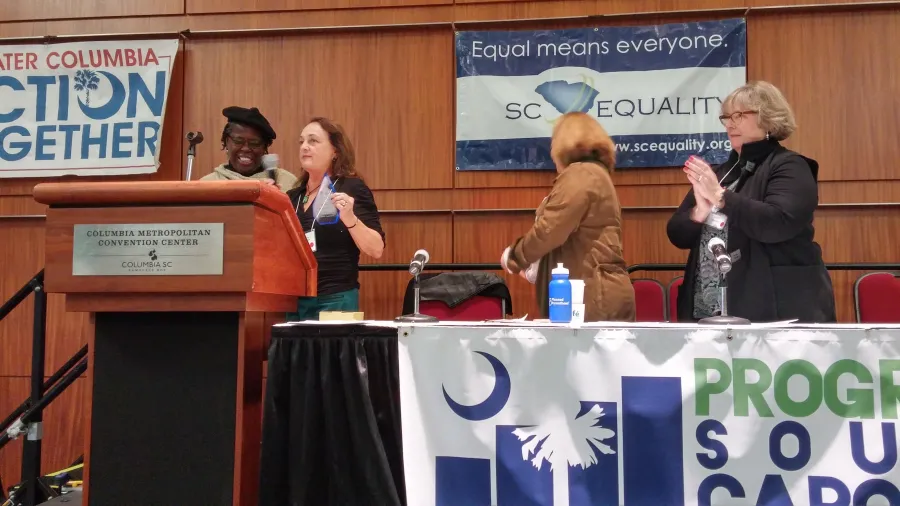Labor Among Focuses of Progress SC Summit

Labor Among Focuses of Progress SC Summit
The newly-formed Progress South Carolina brought together 25 activist organizations for a two-day summit in Columbia that included labor among the leading issues. The South Carolina AFL-CIO was one of many sponsors of the event
The event featured debates between the Democratic candidates in the races for both Governor and US House, 2nd District, which includes Richland and other Midlands counties.
One of the questions in the gubernatorial debate was, “Do you support the right for labor unions to organize in South Carolina, yes or no?”
Candidates Phil Noble and James Smith answered “yes.” Newly-announced candidate Marguerite Willis, a corporate attorney from Florence, answered “no.”
Among the numerous workshops featured was one on “Why are Unions Despised in South Carolina”, moderated by activist Susan Smith.
One member of the audience was a Teamster member who had moved from the New York City area. She asked for an explanation of South Carolina’s “Right-to-Work” law. SC AFL-CIO President Erin McKee explained that in right-to-work states if someone chooses to work at a union facility they don’t have to pay union dues.
“In right-to-work states they never have to join the union but the unions have to cover the costs for the representation that the non-union workers receive," McKee said. "In non-right-to-work states they only have to pay fees to cover the costs related to the contract.” She compared that to choosing to live in a gated community with a pool and tennis courts without paying homeowners’ association fees. “Try that and you will end up with a lien on your home,” she said(see video).
McKee said that right-to-work doesn’t give anyone rights but actually takes money away from the unions, weakening their ability to represent their members.
Retired labor law professor and labor arbitrator Dr. Hoyt Wheeler was among the workshop panelists. Commenting on the important role that unions play, he said that up to 60% of union employees have had their jobs reinstated following unjustified termination, but said that the same figure was a mere 5% for non-union employees.
SC AFL-CIO Vice President Joe Shelly also participated in the panel. Shelly said that his father had been a union member and that he was educated in the importance of labor from an early age. He said that union is a bad word in South Carolina but said that many workers don’t realize how much better their pensions, social security, benefits and pay would be under a union. He said that some union members don’t think about the fact that their benefits likely depend on their union status.
SC AFL-CIO President Emeritus Donna Dewitt spoke about going to work at age 17 in a unionized BellSouth facility. She said she didn’t join the Communications Workers of America immediately because she was young and didn’t know a lot about unions but after seeing how some workers were not treated fairly she knew that joining would give her a voice to speak up. Dewitt eventually became the first female president of the SC AFL-CIO, winning an election against a couple of male competitors who chose to run against her after she announced.
SC AFL-CIO Legislative Liaison John Brisini gave a presentation entitled “Common Sense Economics,” an AFL-CIO program that explains that our imbalanced economy is the result of the choices that our elected leaders made and continue to make. He explained why words like “neoliberalism” are not what you might think. “Neoliberalism” actually refers to," unrestrained corporate power", an economic policy that favors purely free-market capitalism. It’s a 20th-century resurgence of 19th-century ideas associated with laissez-faire economic liberalism.
William Christopher with the South Carolina AFL-CIO manned the AFL-CIO table, giving out labor literature and explaining the meaning of the orange and yellow banner in front of the table that read “Right-to-Work = Low Pay.” The table was well-placed among the hall full of information tables, in the #1 position, located just across from the event's main registration tables. Christopher also collected signatures on cards that will go to members of the South Carolina congressional delegation asking them not to privatize the VA hospitals.
Progress South Carolina Director Mike Morrill said that approximately 800 people signed up for the two-day event and that the group’s leadership was extremely pleased to hold it at the Columbia Metropolitan Convention Center. He said this would be the start of something big, a coalition-building event that would allow many different groups to pull together.